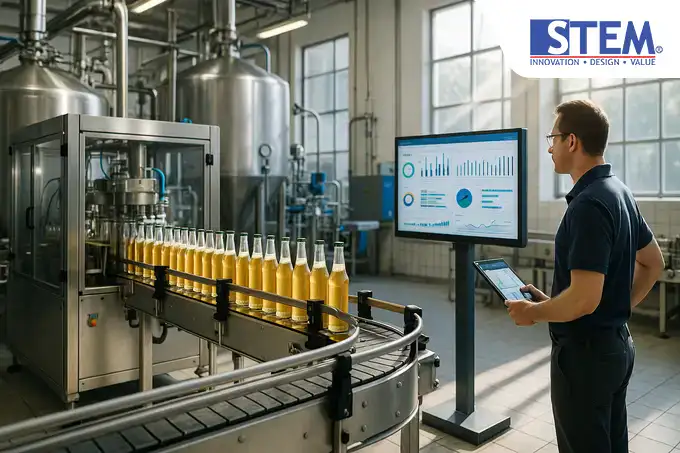The food and beverage (F&B) industry in Indonesia is a fiercely contested arena, where relentless competition, narrow margins, and ever-evolving consumer demands compel every enterprise to operate with heightened agility and efficiency.
Yet, behind the polished products that grace the consumer’s table lies a labyrinth of unique challenges: the looming threat of expired stock, stringent food safety regulations, and the intricate complexities of supply chains. Here, ERP solutions for the food and beverage sector emerge as a strategic cornerstone—not merely to survive, but to triumph in this unforgiving landscape.
An Enterprise Resource Planning (ERP) system, tailored for the F&B industry, is no longer just software. It stands as the digital backbone that seamlessly integrates every operational facet.
From recipe formulation to distribution, ERP provides visibility, control, and efficiency unattainable by manual processes or disparate systems.
This article delves deeply into the key challenges in the food and beverage business and demonstrates how ERP becomes the definitive solution.
Critical Challenges in the Food & Beverage Industry That Must Be Overcome
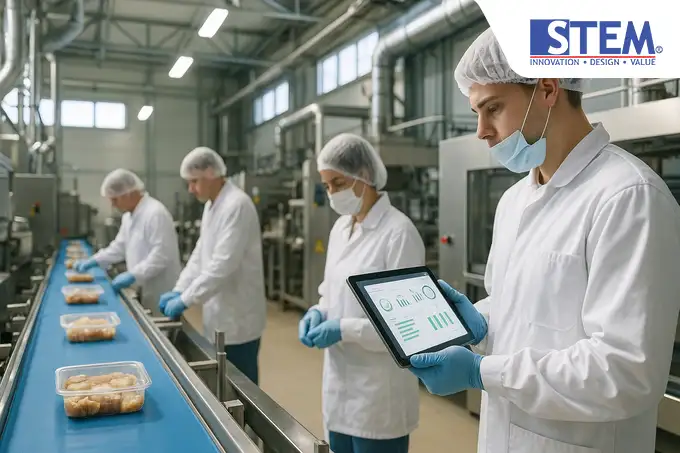
Every player in the F&B sector, whether mid-sized or large-scale, is familiar with a daunting array of operational obstacles. Without an integrated system, these challenges swiftly erode profitability and tarnish brand reputation.
1.1 Complex Production & Recipe Management
Production in F&B hinges on recipe precision and consistency. Even the slightest error in ingredient measurement can compromise taste, quality, and safety.
The central challenge of food production lies in maintaining this standardization across every batch, particularly as operations scale. Managing recipe variations, new product lines, and volatile raw material costs manually is error-prone and time-consuming.
1.2 The Menace of Expired Stock
This is the greatest nightmare in the F&B business. Every product has a finite shelf life. The problem of expired inventory not only results in immediate financial loss but also wastes resources and risks brand damage should defective products reach consumers.
Without robust batch and expiry date management, applying FIFO (First-In, First-Out) or FEFO (First-Expired, First-Out) becomes an insurmountable task.
1.3 The Demand for Traceability & Product Recalls
In cases of contamination or quality concerns, the ability to trace products swiftly and accurately is paramount.
Imagine recalling a single batch of products. From which supplier did the raw material originate? When was it produced? To which distributors was it delivered?
Absent a reliable ERP traceability system, recalls may take days, causing financial damage and eroding public trust.
1.4 Compliance with Stringent Regulations (HACCP, BPOM)
The F&B industry is governed by rigorous standards such as Hazard Analysis and Critical Control Points (HACCP) and regulations from BPOM.
Ensuring ERP-enabled compliance requires complete documentation of every production stage—from raw material intake and processing to quality control.
Managing this manually is not only inefficient but perilous during audits.
1.5 Complex Supply Chain & Distribution Networks
The F&B supply chain encompasses suppliers, factories, warehouses, distributors, and retailers. Managing such a complex ERP-enabled supply chain demands full visibility.
Challenges include coordinating deliveries, managing multi-location inventory, optimizing routes, and ensuring timely order fulfillment.
Delays or errors in the supply chain can result in empty shelves—or conversely, stockpiles of soon-to-expire goods.
Why ERP Is the Definitive Solution for F&B
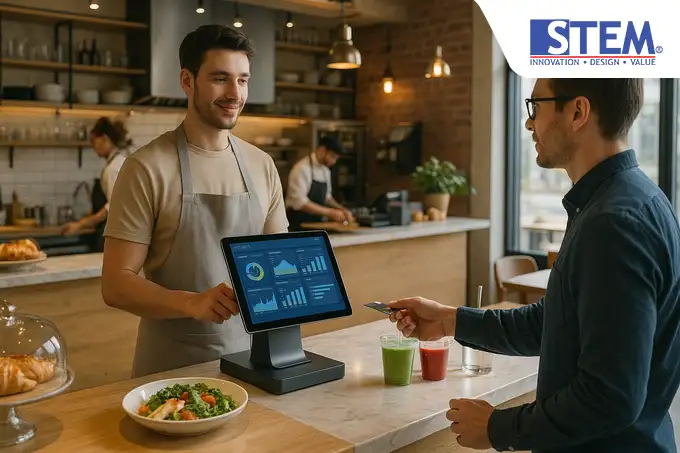
Confronted with these formidable challenges, ERP emerges as the ultimate solution for the food industry, integrating every business process within a centralized platform.
This is no longer about solving isolated issues—it is about building a resilient, transparent, and responsive operational ecosystem. ERP thus becomes a strategic investment.
Automated Production & Batch Management
ERP automates Material Requirement Planning (MRP) based on sales orders and recipes.
Each production batch is uniquely numbered, recording all raw materials used, production dates, and expiry dates. This safeguards recipe consistency and simplifies traceability.
Quality Control & Regulatory Compliance
ERP establishes quality control checkpoints throughout production.
Inspection results are recorded directly in the system, creating a comprehensive digital audit trail. Documentation for HACCP and BPOM compliance becomes far more efficient and accessible.
Full Integration of Supply Chain & Distribution
ERP links sales, inventory, and procurement data in real-time. When an order arrives, the system checks stock availability, schedules production if necessary, and manages delivery logistics.
This enables end-to-end visibility, empowering better decisions.
Real-Time Data for Swift Decision-Making
Management no longer waits for laborious weekly or monthly reports. ERP dashboards present real-time insights instantly.
How many units of Product A sold today? How much of Ingredient B remains? Which products are nearing expiry? Answers appear in seconds, enabling agile responses.
Case Study: Transforming an F&B Company with ERP
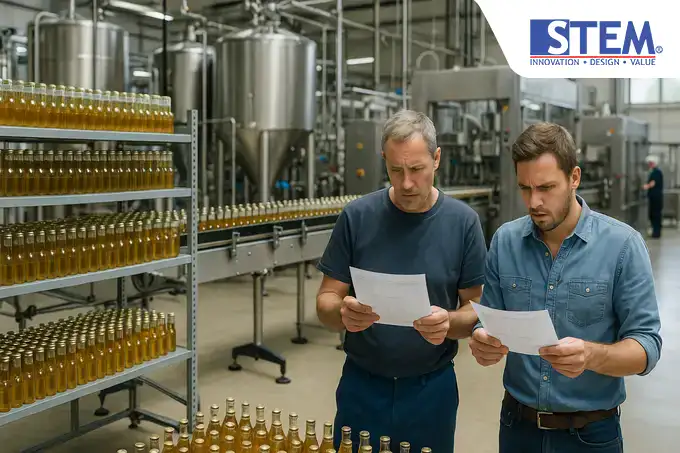
Consider a mid-sized bottled beverage company in Indonesia.
Previously reliant on spreadsheets and disparate accounting tools, they grappled with chronic overproduction in certain flavors while others went out of stock.
They also struggled to trace which product batches were shipped to which cities, slowing complaint resolution.
After implementing ERP tailored for F&B, transformation followed:
- Production Planning: MRP accurately predicted raw material needs and production schedules from historical sales and incoming orders, reducing overproduction by 25%.
- Inventory Management: Automated batch and expiry tracking cut waste from expired products by 40%.
- Traceability: Quality issues could now be pinpointed to affected batches in minutes instead of days.
This F&B ERP case study proves that the right system delivers substantial ROI through cost efficiency and enhanced customer service.
The Right ERP Solution: SAP Business One for F&B
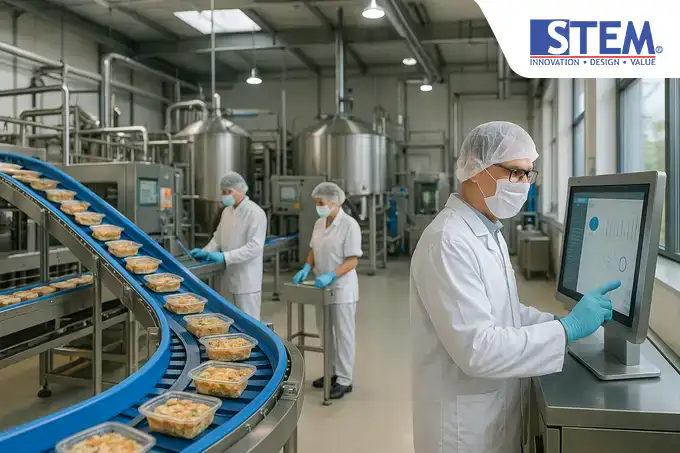
Not all ERP systems are created equal. The F&B industry demands flexibility and specialized functionality.
SAP Business One is among the most widely adopted SAP ERP solutions for food by mid-sized enterprises, offering comprehensive capabilities:
- Production & Batch Control Module: Manages Bills of Materials (BOM), production orders, and batch/serial tracking from raw materials to finished goods.
- Quality Control & Compliance Module: Facilitates inspections at every stage and stores all regulatory audit data.
- Supply Chain & Distribution Module: Integrates inventory, purchasing, sales, and logistics for smooth, efficient operations.
Key Benefits of ERP Implementation in F&B
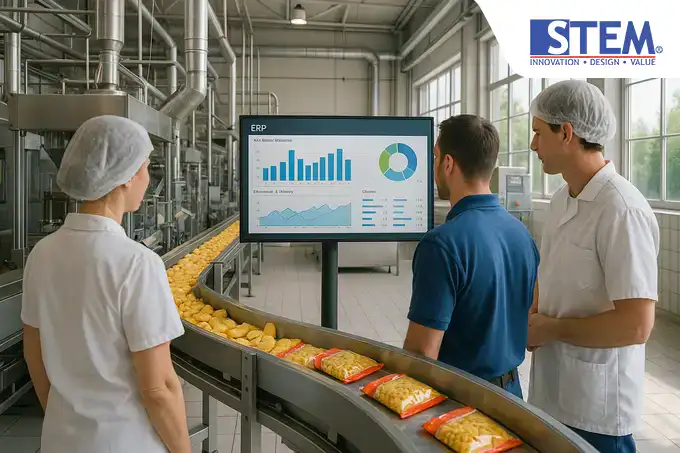
Adopting ERP yields transformative advantages:
- Cost & Operational Efficiency: Reduces material waste, optimizes inventory, and automates manual tasks.
- Minimized Risk of Product Failure & Expiry: Rigorous quality checks and systematic FEFO management ensure only the best products reach market.
- Simplified Regulatory Compliance: Comprehensive digital audit trails streamline HACCP/BPOM inspections and mitigate penalties.
- Enhanced Competitiveness: Real-time data enables rapid market responses, improved customer service, and smarter strategic choices.
FAQ
1. What are the main challenges of the food & beverage industry?
They include complex recipe management, the risk of expired stock, heightened traceability demands for recalls, strict compliance with HACCP and BPOM, and navigating a complex supply chain.
2. How does ERP support traceability in F&B?
ERP tracks every movement of raw materials and finished goods with batch or lot numbers, linking supplier data, production, and delivery.
In case of issues, companies can trace backward or forward within minutes.
3. What is the best ERP solution for F&B?
The ideal ERP offers features such as batch and expiry management, integrated quality control, recipe handling, and traceability.
SAP Business One stands out for mid-sized F&B companies due to its flexibility and comprehensive suite of tools.
4. Does ERP support HACCP & BPOM compliance?
Absolutely. ERP centralizes documentation of critical processes such as inspections, temperature logs, lab tests, and sanitation, creating verifiable digital audit trails indispensable for compliance.
Conclusion: Your Path to Operational Excellence
The food and beverage industry is fraught with challenges that cannot be addressed with piecemeal solutions. From complex production to regulatory demands, every aspect calls for an integrated, intelligent system.
ERP solutions for the food industry, such as SAP Business One, are no longer a luxury but a strategic necessity to achieve efficiency, safety, and sustainable growth.
With a robust digital foundation, challenges transform into opportunities, ensuring every product delivered is safe, high-quality, and efficient.
Ready to elevate your F&B business? Don’t let manual processes hinder your growth. Transition to a proven solution today.
Contact PT. Sterling Tulus Cemerlang (STEM) now for a complimentary consultation and discover how SAP Business One can be tailored to the unique needs of your food and beverage enterprise. Schedule your demo today!

